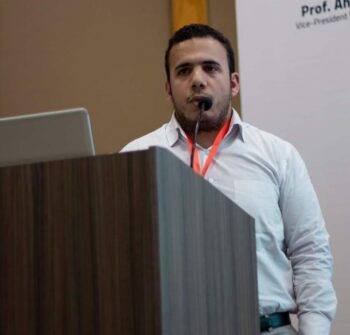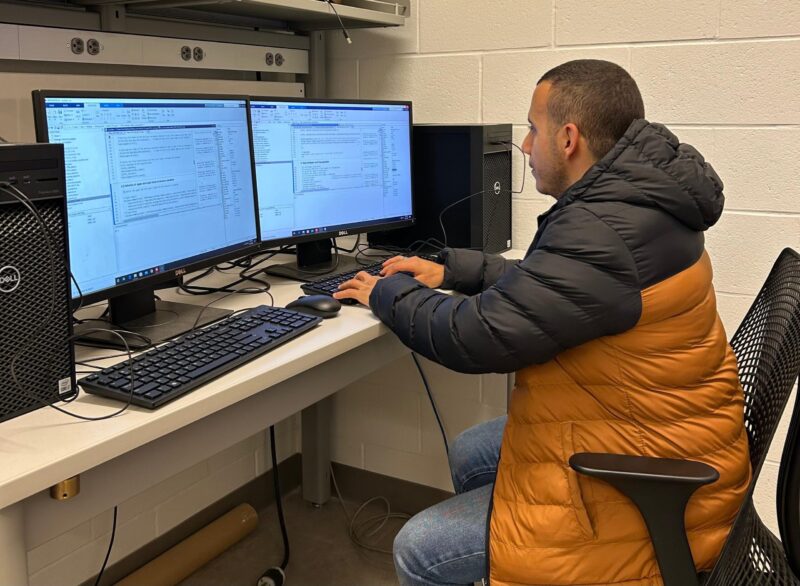Engineering the future: How a Lassonde graduate student is helping transform power system cybersecurity
Tags:

Graduate students are one of the driving forces behind research at York University’s Lassonde School of Engineering, applying their ingenuity and creative ideas to develop groundbreaking solutions for a brighter future. Within the School’s four departmental areas, students are leading a range of innovative projects, from AI-driven technologies to advanced structural materials.
Among these students is Ahmed Abdelaziz, PhD candidate in the Electrical Engineering & Computer Science department, who is conducting research under the guidance of Professor Hany Farag. Professor Farag’s visionary work is focused on power systems innovation – and Abdelaziz is playing a crucial role in advancing these efforts.

“My work aims to improve cybersecurity of electrical power systems,” says Abdelaziz. “It is a novel area of research that ensures these systems are secure against wireless attacks.”
Electrical power systems are essential for providing energy to homes, businesses, hospitals and other sectors, ensuring the seamless operation of society. However, as the demand for energy grows and these systems become more complex, they are increasingly susceptible to cyberattacks which can disrupt daily activities and pose serious, potentially life-threatening risks.
To protect these systems and the communities they support, Abdelaziz is applying his expertise to detect cyberattacks and pinpoint their location within a power system using a novel approach known as feasibility area.
“By detecting an attack and identifying its location, we can then work towards a mitigation strategy,” he says. “We are specifically focused on protecting systems against stealth infiltrated cyberattacks. These occur when the attacker’s main objective is to remain undetected.”
Navigating the complexities of power systems cybersecurity is no small feat, but the feasibility area approach has the potential to revolutionize the field. By leveraging machine learning to analyze large datasets and uncover hidden patterns, this strategy can help predict the likely location of attacks. This technique not only simplifies the detection process but also provides an edge in protecting critical infrastructure against evolving cyberthreats.
Recently, the promise of the feasibility area approach was validated in a paper published in the Institute of Electrical and Electronics Engineer’s (IEEE) Transactions on Information Forensics and Security. The work was also recognized during the Best Paper session at the 2023 IEEE Power & Energy Society General Meeting – the premier annual power and electrical engineering event, bringing together leaders from across the globe.
The two-stage method demonstrated its effectiveness in identifying anomalies within power system data and detecting the presence of a cyberattack. The results underscore its potential for early detection and rapid mitigation, marking significant advancement in cybersecurity technology.

“One thing that’s great about this method is that it doesn’t require new information, so there’s potential to use it in other domains like abnormal event detection or object identification,” he says. “Working on this novel area of research has significantly enhanced the overall quality of my PhD experience. My supervisor has also been so kind and supportive, from guiding me through research opportunities to helping secure funding; he treats his research team like family.”
Looking ahead, Abdelaziz will further refine the feasibility area approach and explore innovative methods for aiding power systems in recovering from cyberattacks. His work exemplifies the broader impact of graduate students at Lassonde who are at the forefront of technological innovation. These students are immersed in transformative projects that push the boundaries of their fields, gaining invaluable hands-on experience and critical problem-solving skills. At Lassonde, graduate students like Abdelaziz are more than just researchers; they are trailblazers driving forward new discoveries and vital solutions.
“The supportive research community at Lassonde fosters a friendly work environment, promotes a healthy work-life balance and offers world-class smart grid labs and facilities. These were key motivators for me to pursue my education here, along with the School’s commitment to diversity and equal opportunity. Lassonde has truly felt like home and empowered me to exceed my own expectations.”